Contents
- History of occurrence
- Description of the variety of carrots Children’s sweetness
- Characteristics of carrots Children’s sweetness
- Advantages and disadvantages
- Features of planting and care
- Pest and disease control
- Harvesting and storage of crops
- Conclusion
- Reviews of gardeners about carrots Children’s sweetness
Breeders are constantly working on breeding carrots that not only have excellent technical characteristics, but also have great taste. A whole series of root crops with a high content of sugars and carotene has been released. One of the most famous varieties is carrots Children’s sweets.
History of occurrence
Carrots (daucus carota subsp. sativus) Children’s sweets obtained from the research and production company ” Seeds”. In 2010, it was included in the State Register of Breeding Achievements, recommended and approved for cultivation in the regions of the Central Black Earth region of the Federation.
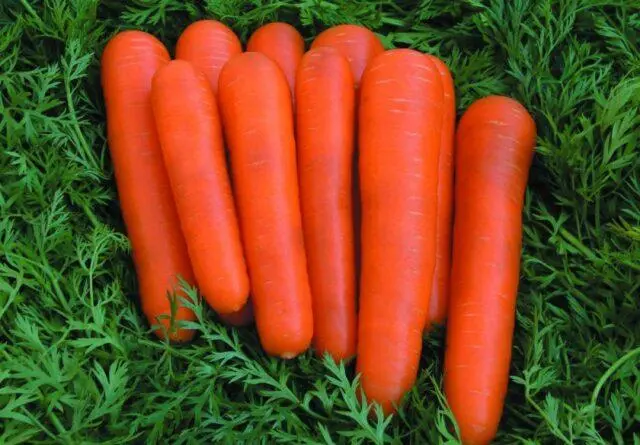
The author of the children’s sweet variety is Z. Vinogradov. S. and Semin A. S.
Carrots “Children’s sweetness” – one of the many created on the basis of the variety of Polish selection Amsterdam (daucus sativus Amsterdamska). Spojnia scientists got it at the end of the last century. The undoubted advantages of Amsterdam carrots are undemanding to soil and weather conditions. It was they who served as the reason that the Polish variety gave rise to new ones, in particular, Children’s sweets.
Description of the variety of carrots Children’s sweetness
The plant forms a spreading rosette of dissected foliage of medium length. Its color is bright green. Root crops of the variety Children’s Sweetness are dense, aligned cylindrical in shape, with a pointed tip. The surface is smooth, the pulp is without a core. The color is bright orange, uniform throughout the volume. Under favorable conditions, carrots reach 20 cm in length and weigh about 200 g. Mature root crops are distinguished by a high content of sugar (8,4 g) and carotene (18 mg) per 100 g of product. Due to its sweet taste, it is used in baby food, consumed fresh and after heat treatment.
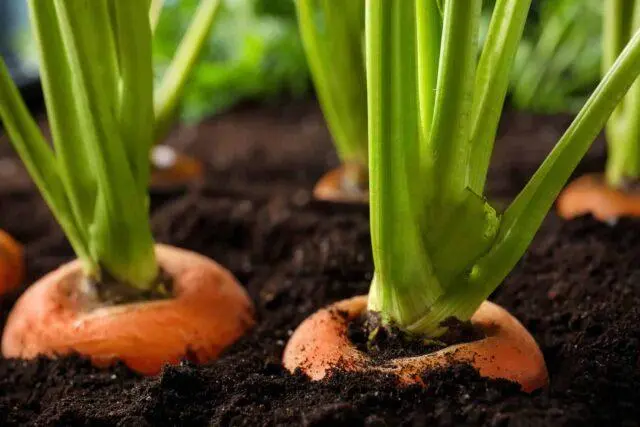
During the growth period, the root crops of the Children’s Sweetness variety often protrude above the ground.
Characteristics of carrots Children’s sweetness
The variety belongs to medium early. It is frost-resistant, can be sown in spring or before winter, when the air temperature drops to +5 ⁰С. Carrot Baby sweetness is drought-resistant, requires regular watering in the first half of the growing season. The taste is excellent, the variety is recommended for making juices, purees, preparations for the winter. Root crops have high transportability and a long storage period, subject to the necessary conditions – temperature and humidity.
Ripening period
To achieve the technical ripeness of the variety Detskaya Sladko, 110 to 130 days are needed after the appearance of the first shoots. Most often, root crops are dug up and stored for storage in the second decade of September. When sowing before winter, harvesting begins 2-3 weeks earlier than usual. Carrots can be used fresh from July, but during this period they are not sweet enough and cannot be stored for a long time.
Carrot yield Children’s sweetness
Growing a vegetable on an industrial scale gives a yield of 290-330 kg / ha. When conducting varietal tests, the greatest result was achieved in the Voronezh region – 647 centners per hectare. On personal plots, the average yield is 4-7 kg / m2.
Several factors influence this performance:
- Illumination of the site.
- Soil quality.
- Compliance with sowing dates.
- Annual crop rotation.
- Timely thinning of plants.
- Regular watering, loosening, weed removal.
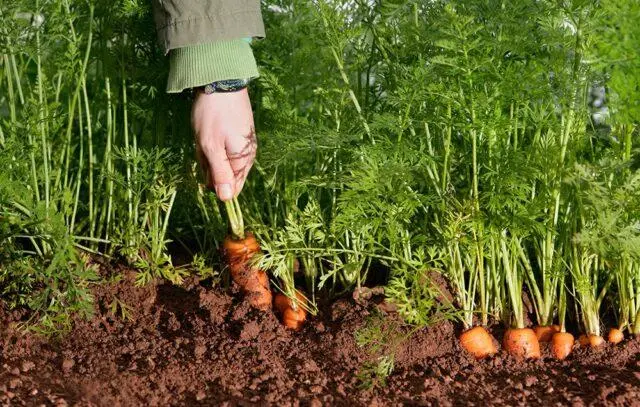
Growing carrots in the shade not only reduces yields, but also prevents root crops from accumulating enough sugars.
Disease and pest resistance
Variety Children’s sweetness does not have a special resistance to diseases and damage by insect pests. To increase these indicators, it is necessary to carry out pre-sowing disinfection of the soil and seeds, observe the agricultural technology of growing carrots, harvest the crop in a timely manner, do not cause mechanical damage to root crops, and store them correctly.
Growing regions
The carrot variety Children’s Sweetness is recommended for cultivation in the Central Chernozem Region, but despite this, it can be successfully cultivated in most other regions. To obtain a guaranteed harvest, sowing dates should be adjusted depending on climatic conditions:
- In central Our Country, land in the third decade of April.
- In Siberia – in early May.
- In the southern regions – in mid-March, while the soil remains moist.
Advantages and disadvantages
The sugar content in the grade Children’s sweetness is twice the average for carrots.
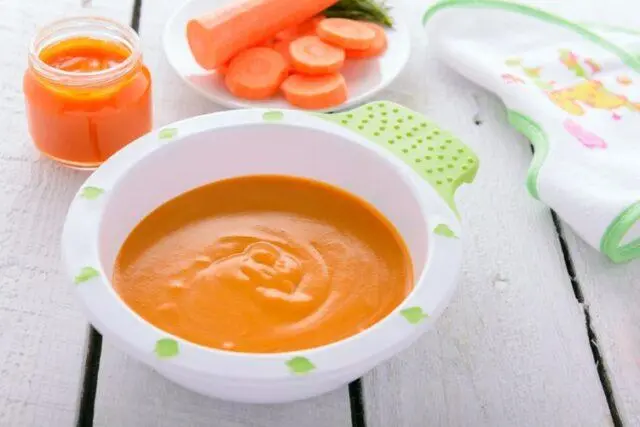
Sweet root crop is ideal for preparing baby and diet food
Pros:
- excellent taste;
- juiciness of root crops;
- the possibility of cultivation in most regions;
- high transportability;
- duration of storage;
- resistance to lower air temperature;
- stable and regular harvest;
- obtaining seeds with the preservation of varietal characteristics.
Cons:
- low immunity to major diseases and damage by insect pests;
- the need for hilling root crops protruding above the surface;
- high demands on soil fertility.
Features of planting and care
Carrot Baby sweetness prefers light, loose loamy or sandy soil. It is carefully dug up, weeds are removed, and complex mineral fertilizer is applied immediately before sowing. On the prepared ridges, grooves are made 2-3 cm deep with an interval between rows of 20 cm. Seeds are sown in late April, early May, when the air temperature reaches + 16-20 ⁰С. Granules are placed at a distance of 3 cm from each other, ordinary seeds – more often.
Before the first shoots, the grooves are watered twice a week, after the appearance of seedlings, they are reduced to once. Moisturizing is stopped three weeks before harvest.
To obtain high-quality vegetables, it is necessary to thin out seedlings several times. First, a gap of 2 cm is left between the plants, and later, when the diameter of the root crops reaches 1,5 cm, it is increased to 5 cm.
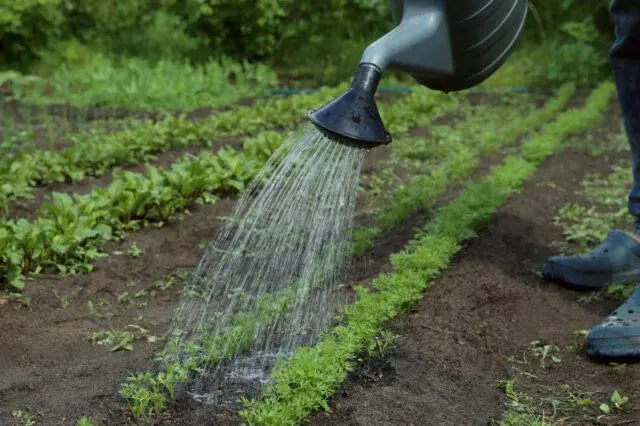
Each watering is completed by loosening the soil and hilling the tops of root crops.
Pest and disease control
Under adverse weather conditions or violation of agricultural technology, the risk of carrot diseases increases. Children’s sweetness. Plants should be inspected periodically to start treatment at an early stage.
Bacteriosis
The very first signs of the disease are yellowing of the lower leaves. Later they turn brown, and sunken brown spots appear on the roots. There is no cure for the disease; diseased carrots are removed and disposed of.
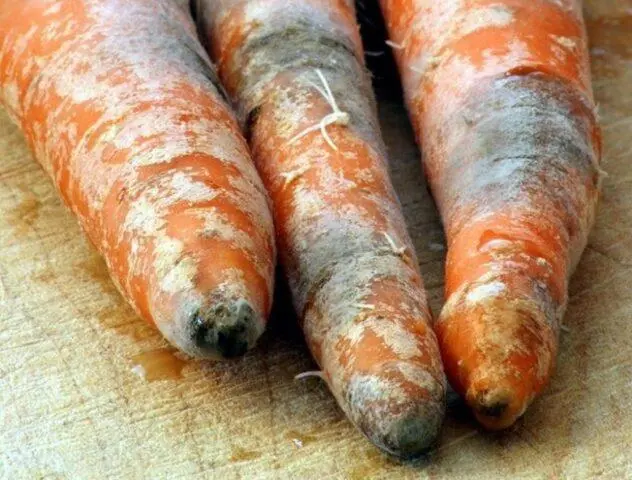
Root crops infected with bacteriosis emit an unpleasant odor
brown spot
Fungal infection occurs as a result of a violation of growing technology. Foliage turns brown at first, then dries out. After the transition of the disease to root crops, they begin to rot.
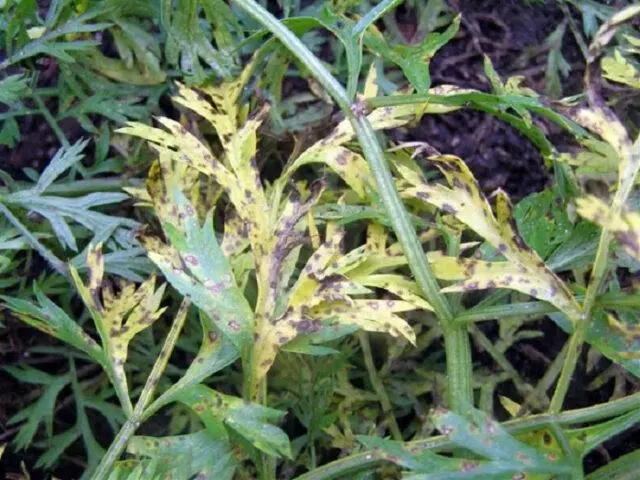
At the first signs of brown spotting, diseased plants are burned, and the soil is treated with a solution of copper sulphate.
Mučnistaâ rosa
White spores appear on the petioles and leaves, which gradually become denser. Later, brown spots form at the site of the lesion, the foliage dries and falls off. As a treatment, pollination with ash and spraying with fungicides are used.
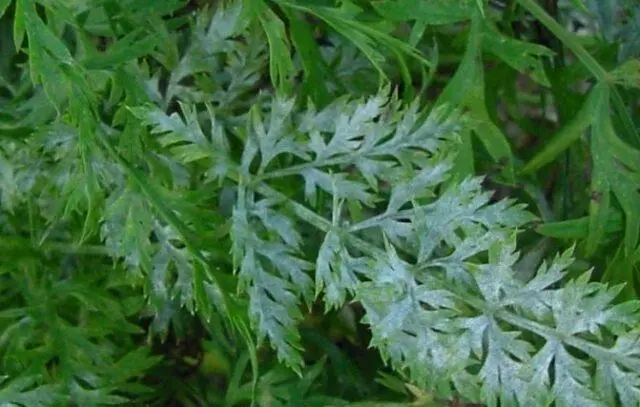
With the defeat of powdery mildew, root crops stop growing
carrot fly
The insect is considered the main pest of carrots, and it is not the fly itself that spoils the roots, but its larvae. Despite the fact that the Baby Sweet variety is considered more resistant to pest damage, its damage cannot be underestimated. To combat the carrot fly, insecticides are used.
For the purpose of prevention, it is necessary to loosen the soil in a timely manner, thin out seedlings, and prevent waterlogging of the soil.
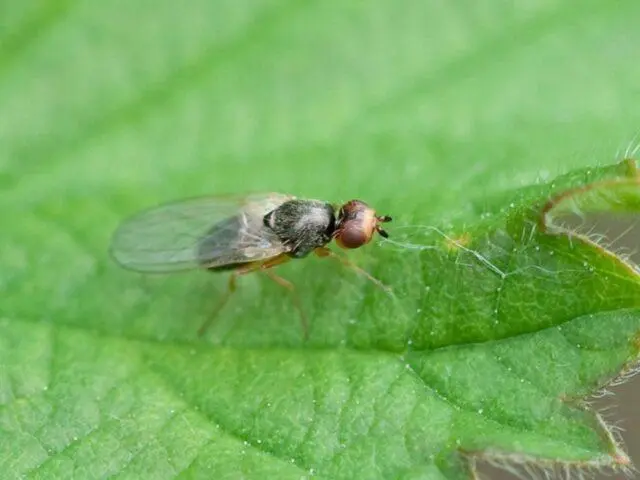
The first symptom of carrot fly damage is a purple-red change in foliage color.
Harvesting and storage of crops
Carrot harvesting Children’s sweetness begins in the first decade of September, when its lower leaves begin to dry. Root crops dug out in dry sunny weather are dried, the tops are cut off, sorted and only healthy, undamaged specimens are stored. The rest of the carrots are processed, making preparations for the winter. The optimal conditions for long-term storage are air temperature from 0 ⁰С to +5 ⁰С, humidity from 90% to 95% and ventilation in the room.
Conclusion
Carrots Children’s sweetness is suitable for making mashed potatoes, juices, and diet food. By choosing it for growing on your site, already in July you can get a vitamin product that even children will like.









